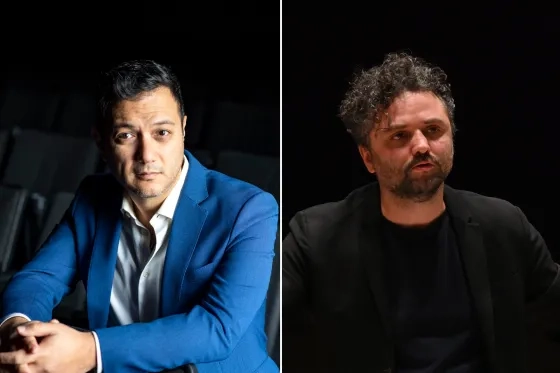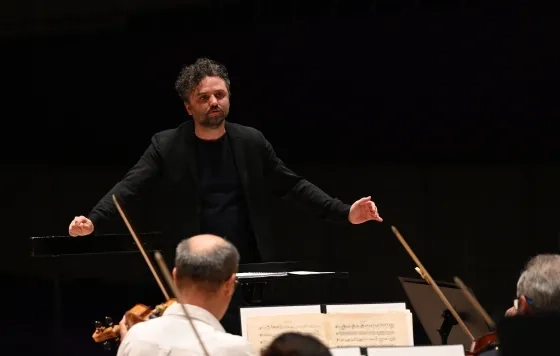A Hoefer Prize-Winning Composition and Acclaimed Tenor Nicholas Phan Anchor Chamber Music Tuesday
A rare vocalist-heavy Chamber Music Tuesday program also features 2014 grad Shahab Paranj’s ‘Diār’ with works by Debussy, Fauré, and Rebecca Clarke.
November’s Chamber Music Tuesday at SFCM will bridge the gap between the old and new, featuring acclaimed tenor Nicholas Phan performing works by Claude Debussy, Gabriel Fauré, and Rebecca Clarke alongside the world premiere of alumnus Shahab Paranj’s Diār.
Phan is a returning performer at the Conservatory, who is represented by Opus 3 Artists, the management company now a part of SFCM’s alliance alongside Askonas Holt and record label PENTATONE. As San Francisco Classical Voice wrote in their review of an October performance by Phan, “Phan can color his voice endlessly, and while there’s power when he wants it, he’s far more likely to lure you in with a thousand degrees of soft singing.” To showcase his talents, Phan placed Debussy’s Ariettes oubliées, selected works for voice and violin by Rebecca Clarke, and Gabriel Fauré’s La bonne chanson on the program.
SFCM’s Composition Department is representing one of its own as well: 2014 grad Paranj, whose Diār won this year’s Hoefer Prize. The Hoefer Prize is a commission for one new work by an alumni composer each year in honor of Jacqueline Stanhope Hoefer, a devout San Francisco arts patron from the 1970s until her death at age 83 in 2006.
“It was a very interesting journey for me when I started at SFCM because it was right after I’d immigrated from Iran,” Paranj recalls. “I had a bachelor’s degree in cello performance from Iran, but because I wanted to start composition, I had to start from zero. I needed a lot of training to learn Western classical music composition, but David Garner was able to manage it in a way that I could still keep my voice as an individual composer while doing so.”
Paranj continues, “It was a tough time. I had a big career as a performer in Iran, and suddenly I had to be a full-time student. But David was always reminding me even as a composer, I have to find my voice. When I was performing in Iran, I was very comfortable and creative, but when composing, I would think too much and try to imitate others. So it was very important that he taught me that I have to be myself.”
Much of Paranj’s voice as a composer draws from not only his cello background, but his experience playing the tombak, a Persian hand drum. “I was part of a very well-known Iranian ensemble, the Shamss Ensemble, touring around the world all the time. We had a concert in Davies Symphony Hall and it was the first time David, who was my teacher, came to one of my concerts.”
Diār is a personally important piece for Paranj. “It’s five movements,” he explains, “and each movement basically represents one musical tradition in Iran. I've been researching diversity and unity in Iran, because we have a lot of languages, religions, and music, and for thousands of years, these people coexist and live together, very naturally and organically.”
Accordingly, Diār’s five movements begin with music from the West of Iran, before proceeding east, south, to the center, and back to the east. The styles represented range from funeral marches to wedding dances, and as Paranj says, “That's the whole concept of this, that somehow these five movements are connecting these disparate peoples, traditions, and cultures.” Transferring Persian music, which involves non-Western intervals like quarter-tones, can be tricky for Paranj, who often has to sing specific pitches for players who haven’t encountered them before, though he credits his musicianship classes at SFCM with making the process easier.
“I'm so honored to receive this award, and it means a lot to me,” he says ultimately. "This is my home. I'm going back to San Francisco Conservancy. I have great memories here. I came from Iran, and I was new; I didn’t know the language very well, but I was very much protected and cared for by the faculty and everyone else at SFCM. I'm thankful for everything they have done for me.”
Learn more about November’s Chamber Music Tuesday, including how to reserve tickets.

